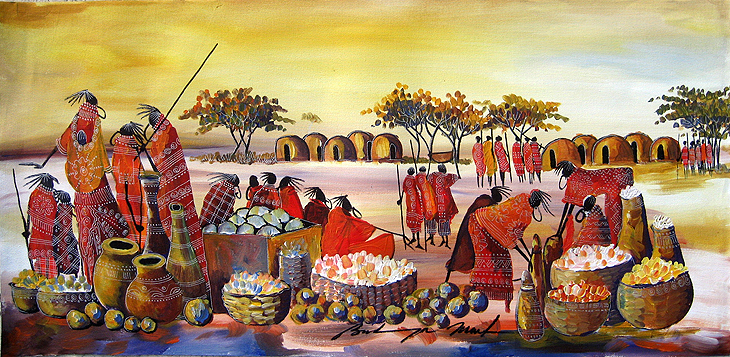
The “Maasai market” (not represented here) is an open-air market where shoppers can find curios, paintings, drawings, clothes and fabrics with Kenyan prints, jewellery and wood-carvings, hand-made by local artisans. The venue for the Maasai Market rotates between different shopping centres and other locations within Nairobi.
For tourists and locals alike, the prices at Maasai Market are very negotiable subject to one’s bargaining prowess and ability to haggle down to the last cent. No receipts are issued for purchases made at the Maasai Market nor should a purchaser expect any warranties or guarantees on items sold at the Maasai Market.
This leads us to our question of the day (QOTD) which is:
If someone buys a painting from
an art gallerythe Maasai market, do they simultaneously buy the copyright and all rights under that copyright? Can the artist subsequently make copies or postcards of the painting that he/she sold? Can the buyer make postcards of the painting and sell them?
From the explanations above, it is clear that all works sold at Maasai market are subject to copyright protection mainly under the category of artistic works. Further, it must be assumed that these artistic works are sold either by the authors themselves, authorised agents or representatives of the authors.
One possible answer to the QOTD would be in the affirmative on condition that the purchaser waits fifty years after the end of the year in which the author of the artistic work dies. In the event that the identity of the author is unknown (which may be the case with Maasai market works), the purchaser would have to wait 50 years from the end of the year in which the artistic work was first created/published.
However, this blogger submits that there is a better answer to the QOTD. In the context of a Maasai market purchase, it appears that that there is no clear assignment of copyright and exclusive license to carry out any of acts controlled by copyright, including reproduction, adaptation and making of derivative works i.e. post cards. This is because section 33(3) of the Copyright Act provides that such assignment of copyright and exclusive license must be in writing signed by or on behalf of the assignor or licensor of the Maasai market work, as the case may be.
Nonetheless, this blogger argues that the purchaser of a Maasai market work enjoys a non-exclusive license to do any act the doing of which is controlled by copyright. According to section 33(4) of the Act, this non-exclusive license need not be in writing and may be oral or inferred from conduct. The Act however provides that such non-exclusive license may be revocable at any time unless granted by contract.
Therefore, for any IP lawyer, the solution to the uncertainty in ownership of rights to Maasai market works may be resolved by simply having something in writing along the lines of:
“I,……the Author hereby irrevocably assigns, conveys and otherwise transfers to…… the Assignee, and its respective successors, licensees, and assigns, worldwide, all right, title and interest in and to the works, and all proprietary rights therein, including, without limitation, all copyrights, trademarks, patents, design rights, trade secret rights, economic rights, and all contract and licensing rights, and all claims and causes of action with respect to any of the foregoing, whether now known, or hereafter to become known.”
This may be food for thought next time you’re strolling past the Maasai market and something catches your eye…